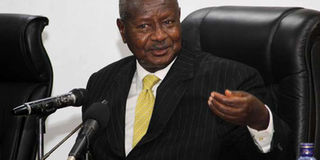Kenya must lead in solving crisis in Burundi

Ugandan President Yoweri Museveni speaks at the end of talks between Burundi's rival political factions in Bujumbura on July 15, 2015. East African Community members are the obvious starting points for any intervention in Burundi. PHOTO | AFP
What you need to know:
- The Arusha Agreement laid the power sharing arrangements that culminated in the 2005 elections in Burundi.
- By virtue of being the leader of the winning party, CNDD-FDD, in the 2005 elections, Pierre Nkurunziza became the president.
- Kenya and the EAC are the obvious starting points for any intervention in Burundi.
Following a period of internal political tensions between the Hutu-led Front for Democracy in Burundi (FRODEBU) and the Tutsi-led Union for National Progress (UPRONA) political parties, Presidents Julius Nyerere of Tanzania and Yoweri Museveni of Uganda instigated a negotiation process in Arusha in July 1996.
The prolonged mediation encountered many twists and turns, including the death of President Nyerere, his replacement in the process by President Nelson Mandela, coups and elections in Burundi, regional blockades against Burundi, and the emergence of strong, new rebel groups such as the National Council for the Defense of Democracy – Forces for the Defense of Democracy (CNDD-FDD).
ARUSHA AGREEMENT
The mediation bore fruit, culminating in the Arusha Agreement which laid out transitional power sharing arrangements, reforms and reconciliation measures.
The Agreement provided for the elections of 2005 where, by virtue of being the leader of the winning party, CNDD-FDD, Pierre Nkurunziza became the president.
The regional economic blockades against Burundi badly damaged an already struggling economy.
But the 2005 elections heralded renewed hope as Burundi began to participate once more in the regional political economy.
Elections were then duly held in 2010 with Mr Nkurunziza being elected the President of Burundi.
In 2015, elections were again due to be held with Mr Nkurunziza once again in contention for the Presidency.
This is where the problems we are witnessing today started.
According to Mr Nkurunziza and his supporters, he was not elected to his first term in office by universal franchise, but rather through his election by Parliament, as he was the presidential candidate of the dominant party.
Therefore, he had only served one term, so that he was constitutionally eligible to stand once more for election as President.
But, opponents held the view that Mr Nkurunziza had already served two terms and that he was thus constitutionally ineligible to stand for election.
In April 2015, the Constitutional Court ruled in favour of Mr Nkurunziza’s candidacy. Elections went ahead in July 2015 in an atmosphere of national unease, and Mr Nkurunziza was declared the winner.
GENOCIDE
The two opposing stances have in the interim continued to harden their positions, in an environment of rising tensions and reported killings.
The word genocide is now once again rearing its ugly head, as the African Union dithers and UN and EU encourage dialogue.
Burundi shares many commonalities with Rwanda, historically, commercially and ethnically. Rwanda has supported Burundi’s political and economic recovery.
However, tensions have now arisen over reports that Burundi is harbouring Interahamwe, the militia largely responsible for the 1994 genocide in Rwanda.
This group has morphed and joined up with various negative forces spread through Eastern DRC, and remains a threat to Rwanda’s security.
Of its East African Community (EAC) neighbours, Kenya has been the more neutral party but together with Uganda, it is on an electioneering mode, and not taking an active role in resolving the crisis.
Still, Kenya and the EAC are the obvious starting points for any intervention in Burundi.
We cannot afford to take an isolationist stance, leaving Burundi to fend for itself, for we risk being infected and overcome by the fever we are ignoring.
Let Kenya act now, before the region is left to deal with a further proliferation of small arms and light weapons, yet another inflow of refugees and protracted regional disagreements.
Kenya’s revamped foreign policy places great emphasis on regional trade and infrastructure and, clearly, it stands to lose if there is a relapse in regional political stability.




